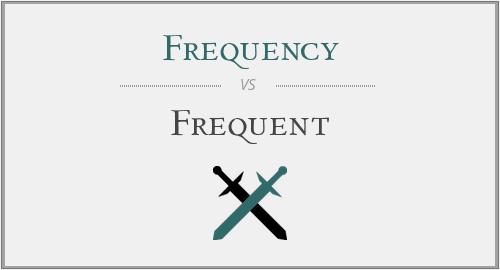Introduction
Words like 'Frequency' and 'Frequent' are commonly used in everyday language, often interchangeably. However, they serve different linguistic purposes and have unique grammatical features. In this essay, we will delve into their differences and similarities, focusing on grammar, etymology, and contextual usage.
Definition and Usage
Frequency
'Frequency' is primarily a noun that describes the rate or occurrence of an event or phenomenon within a specific timeframe. It represents a measure of how often something happens. Examples of 'Frequency' in sentences include:
- "The frequency of earthquakes in this region is concerning."
- "The radio station broadcasts at a high frequency."
Frequent
'Frequent,' on the other hand, is an adjective that characterizes something that happens often or occurs at regular intervals. It describes the nature of an event or action, indicating its repetitive nature. Here are examples of 'Frequent' in sentences:
- "She is a frequent visitor to the museum."
- "Frequent exercise is essential for a healthy lifestyle."
Grammatical Roles
Grammatically, 'Frequency' functions as a noun and is typically the subject or object of a sentence:

- "The frequency of rainfall affects crop growth."
- "Researchers study the frequency of data breaches."
'Frequent,' as an adjective, modifies nouns and often appears before nouns or in adjective clauses:
- "His frequent absences from work raised concerns."
- "The frequent flyers received special privileges at the airline."
Origins
The words 'Frequency' and 'Frequent' have distinct origins:
- 'Frequency' derives from the Latin word 'frequentia,' which means 'a crowd' or 'multitude.' It entered English in the early 17th century and evolved to represent the concept of how often something occurs.
- 'Frequent' also has Latin roots, originating from 'frequens,' which means 'crowded' or 'repeatedly occurring.' It entered English in the late 16th century and took on the role of describing repeated actions or events.
Conclusion
In conclusion, 'Frequency' and 'Frequent' are related terms that are often used interchangeably, leading to occasional confusion. However, they serve distinct grammatical functions and convey different aspects of events or actions. 'Frequency' is a noun representing how often something happens, while 'Frequent' is an adjective describing the repetitive nature of an event or action. Understanding these differences in grammar and meaning is crucial for precise and effective communication in English.




Have a discussion about this article with the community:
Report Comment
We're doing our best to make sure our content is useful, accurate and safe.
If by any chance you spot an inappropriate comment while navigating through our website please use this form to let us know, and we'll take care of it shortly.
Attachment
You need to be logged in to favorite.
Log In